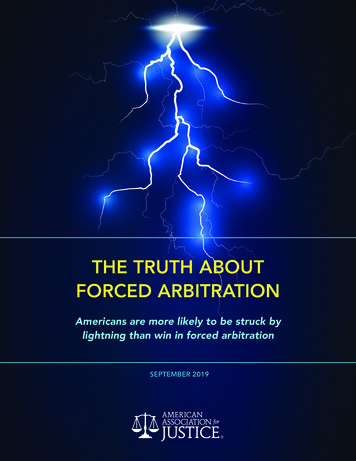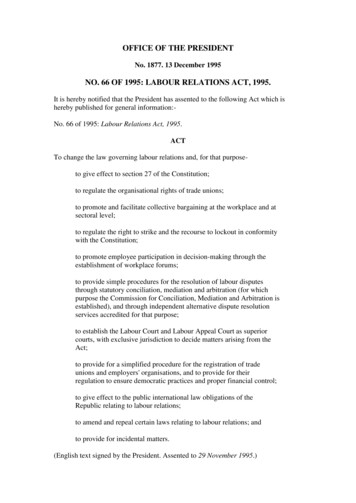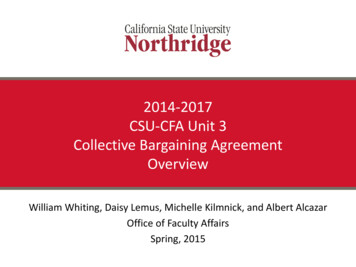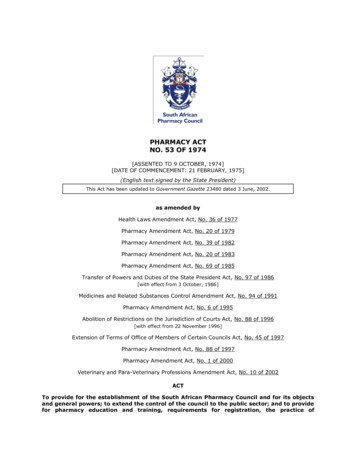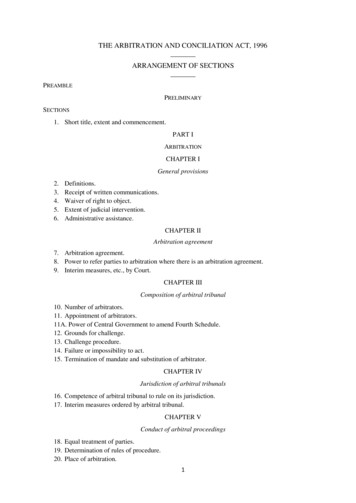
Transcription
THE ARBITRATION AND CONCILIATION ACT, 1996ARRANGEMENT OF SECTIONSPREAMBLEPRELIMINARYSECTIONS1. Short title, extent and commencement.PART IARBITRATIONCHAPTER IGeneral provisions2.3.4.5.6.Definitions.Receipt of written communications.Waiver of right to object.Extent of judicial intervention.Administrative assistance.CHAPTER IIArbitration agreement7. Arbitration agreement.8. Power to refer parties to arbitration where there is an arbitration agreement.9. Interim measures, etc., by Court.CHAPTER IIIComposition of arbitral tribunal10. Number of arbitrators.11. Appointment of arbitrators.11A. Power of Central Government to amend Fourth Schedule.12. Grounds for challenge.13. Challenge procedure.14. Failure or impossibility to act.15. Termination of mandate and substitution of arbitrator.CHAPTER IVJurisdiction of arbitral tribunals16. Competence of arbitral tribunal to rule on its jurisdiction.17. Interim measures ordered by arbitral tribunal.CHAPTER VConduct of arbitral proceedings18. Equal treatment of parties.19. Determination of rules of procedure.20. Place of arbitration.1
SECTIONS21.22.23.24.25.26.27.Commencement of arbitral proceedings.Language.Statements of claim and defence.Hearings and written proceedings.Default of a party.Expert appointed by arbitral tribunal.Court assistance in taking evidence.CHAPTER VIMaking of arbitral award and termination of proceedings28. Rules applicable to substance of dispute.29. Decision making by panel of arbitrators.29A. Time limit for arbitral award.29B. Fast track procedure.30. Settlement.31. Form and contents of arbitral award.31A. Regime for costs.32. Termination of proceedings.33. Correction and interpretation of award; additional award.CHAPTER VIIRecourse against arbitral award34. Application for setting aside arbitral awards.CHAPTER VIIIFinality and enforcement of arbitral awards35. Finality of arbitral awards.36. Enforcement.CHAPTER IXAppeals37. Appealable orders.CHAPTER XMiscellaneous38.39.40.41.42.43.Deposits.Lien on arbitral award and deposits as to costs.Arbitration agreement not to be discharged by death of party thereto.Provisions in case of insolvency.Jurisdiction.Limitations.PART IIENFORCEMENT OF CERTAIN FOREIGN AWARDSCHAPTER INew York Convention Awards44. Definition.2
59.60.Power of judicial authority to refer parties to arbitration.When foreign award binding.Evidence.Conditions for enforcement of foreign awards.Enforcement of foreign awards.Appealable orders.Saving.Chapter II not to apply.CHAPTER IIGeneva Convention AwardsInterpretation.Power of judicial authority to refer parties to arbitration.Foreign awards when binding.Evidence.Conditions for enforcement of foreign awards.Enforcement of foreign awards.Appealable orders.Savings.PART .73.74.75.76.77.78.79.80.81.Application and scope.Commencement of conciliation proceedings.Number of conciliators.Appointment of conciliators.Submission of statements to conciliator.Conciliator not bound by certain enactments.Role of conciliator.Administrative assistance.Communication between conciliator and parties.Disclosure of information.Co-operation of parties with conciliator.Suggestions by parties for settlement of dispute.Settlement agreement.Status and effect of settlement agreement.Confidentiality.Termination of conciliation proceedings.Resort to arbitral or judicial proceedings.Costs.Deposits.Role of conciliator in other proceedings.Admissibility of evidence in other proceedings.PART IVSUPPLEMENTARY PROVISIONS82. Power of High Court to make rules.83. Removal of difficulties.3
SECTIONS84. Power to make rules.85. Repeal and savings.86. Repeal and saving.THE FIRST SCHEDULE.THE SECOND SCHEDULE.THE THIRD SCHEDULE.THE FOURTH SCHEDULE.THE FIFTH SCHEDULE.THE SIXTH SCHEDULE.THE SEVENTH SCHEDULE.APPENDIX.4
THE ARBITRATION AND CONCILIATION ACT, 1996ACT No. 26 OF 1996[16th August, 1996.]An Act to consolidate and amend the law relating to domestic arbitration, internationalcommercial arbitration and enforcement of foreign arbitral awards as also to define the lawrelating to conciliation and for matters connected therewith or incidental thereto.Preamble.—WHEREAS the United Nations Commission on International Trade Law (UNCITRAL)has adopted the UNCITRAL Model Law on International Commercial Arbitration in 1985;AND WHEREAS the General Assembly of the United Nations has recommended that all countries givedue consideration to the said Model Law, in view of the desirability of uniformity of the law of arbitralprocedures and the specific needs of international commercial arbitration practice;AND WHEREAS the UNCITRAL has adopted the UNCITRAL Conciliation Rules in 1980;AND WHEREAS the General Assembly of the United Nations has recommended the use of the saidRules in cases where a dispute arises in the context of international commercial relations and the partiesseek an amicable settlement of that dispute by recourse to conciliation;AND WHEREAS the said Model Law and Rules make significant contribution to the establishment of aunified legal framework for the fair and efficient settlement of disputes arising in internationalcommercial relations;AND WHEREAS it is expedient to make law respecting arbitration and conciliation, taking into accountthe aforesaid Model Law and Rules;BE it enacted by Parliament in the Forty-seventh Year of the Republic of India as follows:—PRELIMINARY1. Short title, extent and commencement.—(1) This Act may be called the Arbitration andConciliation Act, 1996.(2) It extends to the whole of India:Provided that Parts I, III and IV shall extend to the State of Jammu and Kashmir only in so far as theyrelate to international commercial arbitration or, as the case may be, international commercialconciliation.Explanation.—In this sub-section, the expression “international commercial conciliation” shall havethe same meaning as the expression “international commercial arbitration” in clause (f) of sub-section (1)of section 2, subject to the modification that for the word “arbitration” occurring therein, the word“conciliation” shall be substituted.(3) It shall come into force on such date 1 as the Central Government may, by notification in theOfficial Gazette, appoint.PART IARBITRATIONCHAPTER IGeneral provisions2. Definitions.—(1) In this Part, unless the context otherwise requires,—(a) “arbitration” means any arbitration whether or not administered by permanent arbitralinstitution;(b) “arbitration agreement” means an agreement referred to in section 7;1. 22nd August, 1996, vide notification No. G.S.R 375(E), dated 22nd August, 1996, see Gazette of India, Extraordinary, Part II,sec. 3(i).5
(c) “arbitral award” includes an interim award;(d) “arbitral tribunal” means a sole arbitrator or a panel of arbitrators;[(e) “Court” means—1(i) in the case of an arbitration other than international commercial arbitration, the principalCivil Court of original jurisdiction in a district, and includes the High Court in exercise of itsordinary original civil jurisdiction, having jurisdiction to decide the questions forming thesubject-matter of the arbitration if the same had been the subject-matter of a suit, but does notinclude any Civil Court of a grade inferior to such principal Civil Court, or any Court of SmallCauses;(ii) in the case of international commercial arbitration, the High Court in exercise of itsordinary original civil jurisdiction, having jurisdiction to decide the questions forming thesubject-matter of the arbitration if the same had been the subject-matter of a suit, and in othercases, a High Court having jurisdiction to hear appeals from decrees of courts subordinate to thatHigh Court;](f) “international commercial arbitration” means an arbitration relating to disputes arising out oflegal relationships, whether contractual or not, considered as commercial under the law in force inIndia and where at least one of the parties is—(i) an individual who is a national of, or habitually resident in, any country other than India;or(ii) a body corporate which is incorporated in any country other than India; or(iii) 2*** an association or a body of individuals whose central management and control isexercised in any country other than India; or(iv) the Government of a foreign country;(g) “legal representative” means a person who in law represents the estate of a deceased person,and includes any person who intermeddles with the estate of the deceased, and, where a party acts in arepresentative character, the person on whom the estate devolves on the death of the party so acting;(h) “party” means a party to an arbitration agreement.(2) This Part shall apply where the place of arbitration is in India:3[Provided that subject to an agreement to the contrary, the provisions of sections 9, 27 and clause (a)of sub-section (1) and sub-section (3) of section 37 shall also apply to international commercialarbitration, even if the place of arbitration is outside India, and an arbitral award made or to be made insuch place is enforceable and recognised under the provisions of Part II of this Act.](3) This Part shall not affect any other law for the time being in force by virtue of which certaindisputes may not be submitted to arbitration.(4) This Part except sub-section (1) of section 40, sections 41 and 43 shall apply to every arbitrationunder any other enactment for the time being in force, as if the arbitration were pursuant to an arbitrationagreement and as if that other enactment were an arbitration agreement, except in so far as the provisionsof this Part are inconsistent with that other enactment or with any rules made thereunder.(5) Subject to the provisions of sub-section (4), and save in so far as is otherwise provided by any lawfor the time being in force or in any agreement in force between India and any other country or countries,this Part shall apply to all arbitrations and to all proceedings relating thereto.(6) Where this Part, except section 28, leaves the parties free to determine a certain issue, thatfreedom shall include the right of the parties to authorise any person including an institution, to determinethat issue.1. Subs. by Act 3 of 2016, s. 2, for clause (e) (w.e.f. 23-10-2015).2. The words “a company or” omitted by s. 2, ibid. (w.e.f. 23-10-2015).3. Ins. by s. 2, ibid. (w.e. f. 23-10-2015).6
(7) An arbitral award made under this Part shall be considered as a domestic award.(8) Where this Part—(a) refers to the fact that the parties have agreed or that they may agree, or(b) in any other way refers to an agreement of the parties,that agreement shall include any arbitration rules referred to in that agreement.(9) Where this Part, other than clause (a) of section 25 or clause (a) of sub-section (2) of section 32,refers to a claim, it shall also apply to a counterclaim, and where it refers to a defence, it shall also applyto a defence to that counterclaim.3. Receipt of written communications.—(1) Unless otherwise agreed by the parties,—(a) any written communication is deemed to have been received if it is delivered to the addresseepersonally or at his place of business, habitual residence or mailing address, and(b) if none of the places referred to in clause (a) can be found after making a reasonable inquiry, awritten communication is deemed to have been received if it is sent to the addressee's last knownplace of business, habitual residence or mailing address by registered letter or by any other meanswhich provides a record of the attempt to deliver it.(2) The communication is deemed to have been received on the day it is so delivered.(3) This section does not apply to written communications in respect of proceedings of any judicialauthority.4. Waiver of right to object.—A party who knows that—(a) any provision of this Part from which the parties may derogate, or(b) any requirement under the arbitration agreement,has not been complied with and yet proceeds with the arbitration without stating his objection to suchnon-compliance without undue delay or, if a time limit is provided for stating that objection, within thatperiod of time, shall be deemed to have waived his right to so object.5. Extent of judicial intervention.—Notwithstanding anything contained in any other law for thetime being in force, in matters governed by this Part, no judicial authority shall intervene except where soprovided in this Part.6. Administrative assistance.—In order to facilitate the conduct of the arbitral proceedings, theparties, or the arbitral tribunal with the consent of the parties, may arrange for administrative assistanceby a suitable institution or person.CHAPTER IIArbitration agreement7. Arbitration agreement.—(1) In this Part, “arbitration agreement” means an agreement by theparties to submit to arbitration all or certain disputes which have arisen or which may arise between themin respect of a defined legal relationship, whether contractual or not.(2) An arbitration agreement may be in the form of an arbitration clause in a contract or in the form ofa separate agreement.(3) An arbitration agreement shall be in writing.(4) An arbitration agreement is in writing if it is contained in—(a) a document signed by the parties;(b) an exchange of letters, telex, telegrams or other means of telecommunication 1 [includingcommunication through electronic means] which provide a record of the agreement; or1. Ins. by Act 3 of 2016, s. 3 (w. e. f. 23-10-2015).7
(c) an exchange of statements of claim and defence in which the existence of the agreement isalleged by one party and not denied by the other.(5) The reference in a contract to a document containing an arbitration clause constitutes anarbitration agreement if the contract is in writing and the reference is such as to make that arbitrationclause part of the contract.8. Power to refer parties to arbitration where there is an arbitration agreement.— 1 [(1) Ajudicial authority, before which an action is brought in a matter which is the subject of an arbitrationagreement shall, if a party to the arbitration agreement or any person claiming through or under him, soapplies not later than the date of submitting his first statement on the substance of the dispute, then,notwithstanding any judgment, decree or order of the Supreme Court or any Court, refer the parties toarbitration unless it finds that prima facie no valid arbitration agreement exists.](2) The application referred to in sub-section (1) shall not be entertained unless it is accompanied bythe original arbitration agreement or a duly certified copy thereof:2[Provided that where the original arbitration agreement or a certified copy thereof is not availablewith the party applying for reference to arbitration under sub-section (1), and the said agreement orcertified copy is retained by the other party to that agreement, then, the party so applying shall file suchapplication along with a copy of the arbitration agreement and a petition praying the Court to call uponthe other party to produce the original arbitration agreement or its duly certified copy before that Court .](3) Notwithstanding that an application has been made under sub-section (1) and that the issue ispending before the judicial authority, an arbitration may be commenced or continued and an arbitralaward made.9. Interim measures, etc., by Court.—3[(1)] A party may, before or during arbitral proceedings or atany time after the making of the arbitral award but before it is enforced in accordance with section 36,apply to a court—(i) for the appointment of a guardian for a minor or person of unsound mind for the purposes ofarbitral proceedings; or(ii) for an interim measure of protection in respect of any of the following matters, namely:—(a) the preservation, interim custody or sale of any goods which are the subject-matter of thearbitration agreement;(b) securing the amount in dispute in the arbitration;(c) the detention, preservation or inspection of any property or thing which is thesubject-matter of the dispute in arbitration, or as to which any question may arise therein andauthorising for any of the aforesaid purposes any person to enter upon any land or building in thepossession of any party, or authorising any samples to be taken or any observation to be made, orexperiment to be tried, which may be necessary or expedient for the purpose of obtaining fullinformation or evidence;(d) interim injunction or the appointment of a receiver;(e) such other interim measure of protection as may appear to the Court to be just andconvenient,and the Court shall have the same power for making orders as it has for the purpose of, and in relationto, any proceedings before it.4[(2) Where, before the commencement of the arbitral proceedings, a Court passes an order for anyinterim measure of protection under sub-section (1), the arbitral proceedings shall be commenced within aperiod of ninety days from the date of such order or within such further time as the Court may determine.1. Subs. by Act 3 of 2016, s. 4, for sub-section (1) (w. e. f. 23-10-2015).2. Ins. by s. 4, ibid. (w.e.f. 23-10-2015).3. Section 9 shall be renumbered as sub-section (1) thereof by s. 5, ibid. (w.e.f. 23-10-2015).4. Ins. by s. 5, ibid. (w.e.f. 23-10-2015).8
(3) Once the arbitral tribunal has been constituted, the Court shall not entertain an application undersub-section (1), unless the Court finds that circumstances exist which may not render the remedy providedunder section 17 efficacious.]CHAPTER IIIComposition of arbitral tribunal10. Number of arbitrators.—(1) The parties are free to determine the number of arbitrators,provided that such number shall not be an even number.(2) Failing the determination referred to in sub-section (1), the arbitral tribunal shall consist of a solearbitrator.11. Appointment of arbitrators.—(1) A person of any nationality may be an arbitrator, unlessotherwise agreed by the parties.(2) Subject to sub-section (6), the parties are free to agree on a procedure for appointing the arbitratoror arbitrators.(3) Failing any agreement referred to in sub-section (2), in an arbitration with three arbitrators, eachparty shall appoint one arbitrator, and the two appointed arbitrators shall appoint the third arbitrator whoshall act as the presiding arbitrator.(4) If the appointment procedure in sub-section (3) applies and—(a) a party fails to appoint an arbitrator within thirty days from the receipt of a request to do sofrom the other party; or(b) the two appointed arbitrators fail to agree on the third arbitrator within thirty days from thedate of their appointment,the appointment shall be made, upon request of a party, by 1[the Supreme Court or, as the case may be,the High Court or any person or institution designated by such Court];(5) Failing any agreement referred to in sub-section (2), in an arbitration with a sole arbitrator, if theparties fail to agree on the arbitrator within thirty days from receipt of a request by one party from theother party to so agree the appointment shall be made, upon request of a party, by 1[the Supreme Court or,as the case may be, the High Court or any person or institution designated by such Court].(6) Where, under an appointment procedure agreed upon by the parties,—(a) a party fails to act as required under that procedure; or(b) the parties, or the two appointed arbitrators, fail to reach an agreement expected of them underthat procedure; or(c) a person, including an institution, fails to perform any function entrusted to him or it underthat procedure,a party may request 1[the Supreme Court or, as the case may be, the High Court or any person orinstitution designated by such Court] to take the necessary measure, unless the agreement on theappointment procedure provides other means for securing the appointment.2[(6A) The Supreme Court or, as the case may be, the High Court, while considering any applicationunder sub-section (4) or sub-section (5) or sub-section (6), shall, notwithstanding any judgment, decree ororder of any Court, confine to the examination of the existence of an arbitration agreement.(6B) The designation of any person or institution by the Supreme Court or, as the case may be, theHigh Court, for the purposes of this section shall not be regarded as a delegation of judicial power by theSupreme Court or the High Court.](7) A decision on a matter entrusted by sub-section (4) or sub-section (5) or sub-section (6) to 3[theSupreme Court or, as the case may be, the High Court or the person or institution designated by suchCourt is final and no appeal including Letters Patent Appeal shall lie against such decision].1. Subs. by Act 3 of 2016, s. 6, for “the Chief Justice or any person or institution designated by him” (w. e. f. 23-10-2015).2. Ins. by s. 6, ibid. (w.e.f. 23-10-2015).3. Subs. by s. 6, ibid., for “the Chief Justice or the person or institution designated by him is final” (w.e.f. 23-10-2015).9
1[(8) The Supreme Court or, as the case may be, the High Court or the person or institution designatedby such Court, before appointing an arbitrator, shall seek a disclosure in writing from the prospectivearbitrator in terms of sub-section (1) of section 12, and have due regard to—(a) any qualifications required for the arbitrator by the agreement of the parties; and(b) the contents of the disclosure and other considerations as are likely to secure the appointmentof an independent and impartial arbitrator.](9) In the case of appointment of sole or third arbitrator in an international commercial arbitration,[the Supreme Court or the person or institution designated by that Court] may appoint an arbitrator of anationality other than the nationalities of the parties where the parties belong to different nationalities.23[(10) The Supreme Court or, as the case may be, the High Court, may make such scheme as the saidCourt may deem appropriate for dealing with matters entrusted by sub-section (4) or sub-section (5) orsub-section (6), to it.](11) Where more than one request has been made under sub-section (4) or sub-section (5) orsub-section (6) to the Chief Justices of different High Courts or their designates, 4[different High Courtsor their designates, the High Court or its designate to whom the request has been first made] under therelevant sub-section shall alone be competent to decide on the request.5[(12) (a) Where the matters referred to in sub-sections (4), (5), (6), (7), (8) and sub-section (10) arisein an international commercial arbitration, the reference to the “Supreme Court or, as the case may be, theHigh Court” in those sub-sections shall be construed as a reference to the “Supreme Court”; and(b) Where the matters referred to in sub-sections (4), (5), (6), (7), (8) and sub-section (10) arise in anyother arbitration, the reference to “the Supreme Court or, as the case may be, the High Court” in thosesub-sections shall be construed as a reference to the “High Court” within whose local limits the principalCivil Court referred to in clause (e) of sub-section (1) of section 2 is situate, and where the High Courtitself is the Court referred to in that clause, to that High Court.]6[(13) An application made under this section for appointment of an arbitrator or arbitrators shall bedisposed of by the Supreme Court or the High Court or the person or institution designated by such Court,as the case may be, as expeditiously as possible and an endeavour shall be made to dispose of the matterwithin a period of sixty days from the date of service of notice on the opposite party.(14) For the purpose of determination of the fees of the arbitral tribunal and the manner of itspayment to the arbitral tribunal, the High Court may frame such rules as may be necessary, after takinginto consideration the rates specified in the Fourth Schedule.Explanation.—For the removal of doubts, it is hereby clarified that this sub-section shall not apply tointernational commercial arbitration and in arbitrations (other than international commercial arbitration)in case where parties have agreed for determination of fees as per the rules of an arbitral institution.]7[11A. Power of Central Government to amend Fourth Schedule.—(1) If the Central GovernmentGovernment is satisfied that it is necessary or expedient so to do, it may, by notification in the OfficialGazette, amend the Fourth Schedule and thereupon the Fourth Schedule shall be deemed to have beenamended accordingly.(2) A copy of every notification proposed to be issued under sub-section (1), shall be laid in draftbefore each House of Parliament, while it is in session, for a total period of thirty days which may becomprised in one session or in two or more successive sessions, and if, before the expiry of the sessionimmediately following the session or the successive sessions aforesaid, both Houses agree indisapproving the issue of the notification or both Houses agree in making any modification in the1. Subs. by Act 3 of 2016, s. 6, for sub-section (8) (w.e.f. 23-10-2015).2. Subs. by s. 6, ibid., for “the Chief Justice of India of India or the person or institution designated by him” (w.e.f. 23-10-2015).3. Subs. by s. 6, ibid., for sub-section (10) (w.e.f. 23-10-2015).4. Subs. by s. 6, ibid., for “the Chief Justices of different High Courts or their designates, the Chief Justice or his designate towhom the request has been first made” (w.e.f 23-10-2015).5. Subs. by s. 6, ibid., for sub-section (12) (w.e.f. 23-10-2015).6. Ins. by s. 6, ibid. (w.e.f. 23-10-2015).7. Ins. by s. 7, ibid. (w.e.f. 23-10-2015).10
notification, the notification shall not be issued or, as the case may be, shall be issued only in suchmodified form as may be agreed upon by the both Houses of Parliament.]12. Grounds for challenge.—1[(1) When a person is approached in connection with his possibleappointment as an arbitrator, he shall disclose in writing any circumstances,—(a) such as the existence either direct or indirect, of any past or present relationship with orinterest in any of the parties or in relation to the subject-matter in dispute, whether financial, business,professional or other kind, which is likely to give rise to justifiable doubts as to his independence orimpartiality; and(b) which are likely to affect his ability to devote sufficient time to the arbitration and inparticular his ability to complete the entire arbitration within a period of twelve months.Explanation 1.—The grounds stated in the Fifth Schedule shall guide in determining whethercircumstances exist which give rise to justifiable doubts as to the independence or impartiality of anarbitrator.Explanation 2.—The disclosure shall be made by such person in the form specified in the SixthSchedule.](3) An arbitrator may be challenged only if—(a) circumstances exist that give rise to justifiable doubts as to his independence or impartiality,or(b) he does not possess the qualifications agreed to by the parties.(4) A party may challenge an arbitrator appointed by him, or in whose appointment he hasparticipated, only for reasons of which he becomes aware after the appointment has been made.2[(5) Notwithstanding any prior agreement to the contrary, any person whose relationship, with theparties or counsel or the subject-matter of the dispute, falls under any of the categories specified in theSeventh Schedule shall be ineligible to be appointed as an arbitrator:Provided that parties may, subsequent to disputes having arisen between them, waive the applicabilityof this sub-section by an express agreement in writing.]13. Challenge procedure.—(1) Subject to sub-section (4), the parties are free to agree on a procedurefor challenging an arbitrator.(2) Failing any agreement referred to in sub-section (1), a party who intends to challenge an arbitratorshall, within fifteen days after becoming aware of the constitution of the arbitral tribunal or afterbecoming aware of any circumstances referred to in sub-section (3) of section 12, send a writtenstatement of the reasons for the challenge to the arbitral tribunal.(3) Unless the arbitrator challenged under sub-section (2) withdraws from his office or the other partyagrees to the challenge, the arbitral tribunal shall decide on the challenge.(4) If a challenge under any procedure agreed upon by the parties or under the procedure undersub-section (2) is not successful, the arbitral tribunal shall continue the arbitral proceedings and make anarbitral award.(5) Where an arbitral award is made under sub-section (4), the party challenging the arbitrator maymake an application for setting aside such an arbitral award in accordance with section 34.(6) Where an arbitral award is set aside on an application made under sub-section (5), the Court maydecide as to whether the arbitrator who is challenged is entitled to any fees.14. Failure or impossibility to act.—(1) 3[The mandate of an arbitrator shall terminate and he shallbe substituted by another arbitrator, if]—(a) he becomes de jure or de facto unable to perform his functions or for other reasons fails to actwithout undue delay; and1. Subs. by Act 3 of 2016, s. 8, for sub-section (1) (w.e.f. 23-10-2015).2. Ins. by s. 8, ibid. (w.e.f. 23-10-2015).3. Subs. by s. 9, ibid., for “The mandate of an arbitrator shall terminate if” (w.e.f. 23-10-2015).11
(b) he withdraws from his office or the parties agree to the termination of his mandate.(2) If a controversy remains concerning any of the grounds referred to in clause (a) of sub-section (1),a party may, unless otherwise agreed by the parties, apply to the Court to decide on the termination of themandate.(3) If, under this section or sub-section (3) of section 13, an arbitrator withdraws from his office or aparty agrees to the termination of the mandate of an arbitrator, it shall not imply acceptance of the validityof any ground referred to in this section or sub-section (3) of section 12.15. Termination of mandate a
7 (7) An arbitral award made under this Part shall be considered as a domestic award.(8) Where this Part— (a) refers to the fact that the parties have agreed or that they may agree, or (b) in any other way refers to an agreement of the parties, that agreement shall include any arbitration rules referred to in that agreement. (9) Where this Part, other than clause (a) of section 25 or clause .

